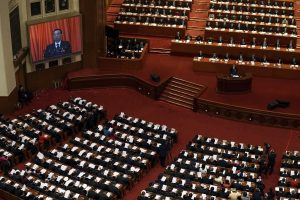The annual session of China’s National People’s Congress (NPC) opened on March 5, with Premier Li Keqiang delivering the government work report to the delegates. This year is an unusually eventful one for the legislature, which will not only approve the latest five-year plan but also remake Hong Kong’s electoral system.
One of the first takeaways from Li’s work report is that China’s GDP target is back. Last year, amid the economic turmoil caused by COVID-19, China did not set a specific growth target. This year, however, the target returned, with Li setting it at “over 6 percent” (essentially a return to 2019 growth levels). The broader goal, according to Xinhua, is to get the “economy firmly back to pre-pandemic vibrancy,” which will also require boosting demand and creating at least 11 million new urban jobs.
Economists have long urged China to drop the specific GDP target to give teeth to its assertion that it is prioritizing quality of growth over quantity. Some analysts suggested China could use the aberration of 2020 to set a new tradition, but, as China watcher Bill Bishop has pointed out, it’s not as simple as just cutting out a number from the work report. The current system requires a GDP target to function.
There are reports, though, that the draft 14th Five Year-Plan (to be approved by the end of the NPC session next week) does not set a cumulative GDP target for the 2021-2026 period. Instead, a new target will be set each year, which would allow more flexibility to respond to emergencies like the COVID-19 crisis.
Speaking of the five-year plan, Li mentioned some highlights during his work report. As expected, the new plan places a heavy emphasis on boosting China’s innovation and technology levels, in line with the objective to make the country a tech powerhouse. According to Li, the five-year plan calls for R&D spending “to grow by over 7 percent annually” – outstripping GDP growth. China will “stick to the innovation-driven development strategy and accelerate the building of a modern industrial system during the 14th Five-Year Plan period,” Xinhua said.
Climate goals are expected to figure in the five-year plan and related long-term goals out to 2035, also to be approved this year. After all, President Xi Jinping had pledged last fall that China’s emissions would peak by 2030, and reach net-zero by 2060 – major new commitments from the world’s top emitter. Li’s work report, however, offered no new details aside from reaffirming those commitments. Those details will have to wait until a new “action plan” to achieve the goals is finalized.
Aside from the five-year plan, the biggest item on the NPC’s agenda is a major overhaul of Hong Kong’s electoral system – a surprise task that was only revealed this week. An op-ed in Xinhua argued that “One direct reason behind the chaos in Hong Kong is that the principle of ‘patriots governing Hong Kong’ has yet to be fully implemented.” The changes to the electoral system are meant to “plug loopholes” so that only Beijing’s supporters can make it into the Legislative Council (LegCo).
While an official draft of the proposal has not been released as of this writing, based on reporting from Hong Kong the reforms would see candidates for LegCo selected – and some directly elected – by the body that already chooses Hong Kong’s chief executive. Under the proposed changes, that body would also see its membership expanded from 1,200 to 1,500, even while seats reserved for district councilors – who are directly elected – would be removed. That would eliminate the possibility of pro-democrats, who dominated the last District Council elections, ever being a deciding voice in who hold Hong Kong’s top office.
Similarly, LegCo itself would be expanded from 70 to 90 seats, but the number of seats directly elected would be reduced by 10, further diminishing Hong Kong’s already severely restricted democracy. On top of that, any candidate would have to be given the official seal of approval as a “patriot” – essentially making it impossible for any outspoken pro-democracy figures to even run. (And keep in mind that these changes come after nearly every prominent opposition political figure has been arrested or forced into exile.)
“Effective measures must be taken to block these pawns of anti-China forces from being elected to [Hong Kong]’s governance architecture, and knock them out once and for all,” Xinhua declared.
As a by-product of the changes, Hong Kong’s LegCo elections – originally scheduled for September 2020 – are expected to be pushed back yet again, to 2022.
On foreign affairs, China will prioritize the signing of an investment treaty with the EU, based on an agreement reached in principle last December. Its next major project is moving forward talks on the China-Japan-South Korea free trade agreement. Meanwhile, Li said China would “actively consider” joining the Comprehensive and Progressive Agreement on Trans-Pacific Partnership (CPTPP), an 11-party mega-deal that includes many of China’s neighbors. The CPTPP has higher standards than the Regional Comprehensive Economic Partnership (RCEP), of which China is already a member.
On China-U.S. relations, Li said China would seek to boost trade ties “on the basis of mutual respect,” which is generally code-speak for a demand that Washington offer more respect to Beijing.

































